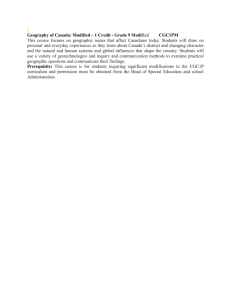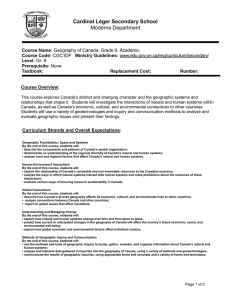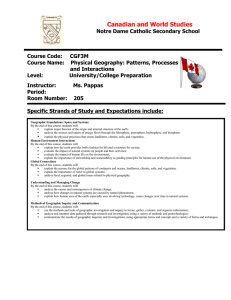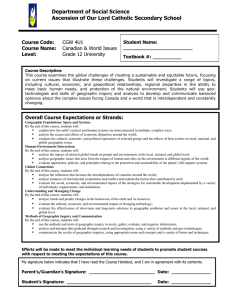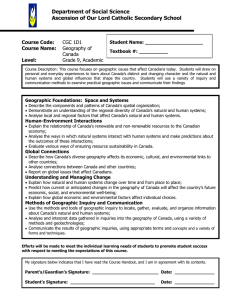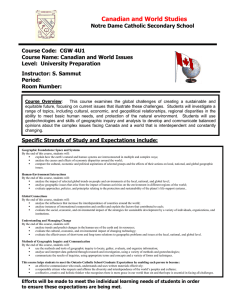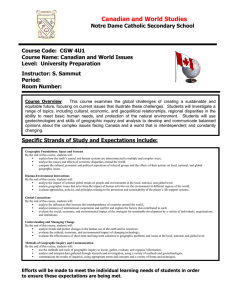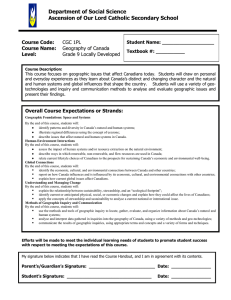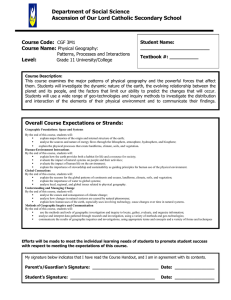Department of Social Sciences CGW4U1 Course Overview World Issues Grade 12 University
advertisement
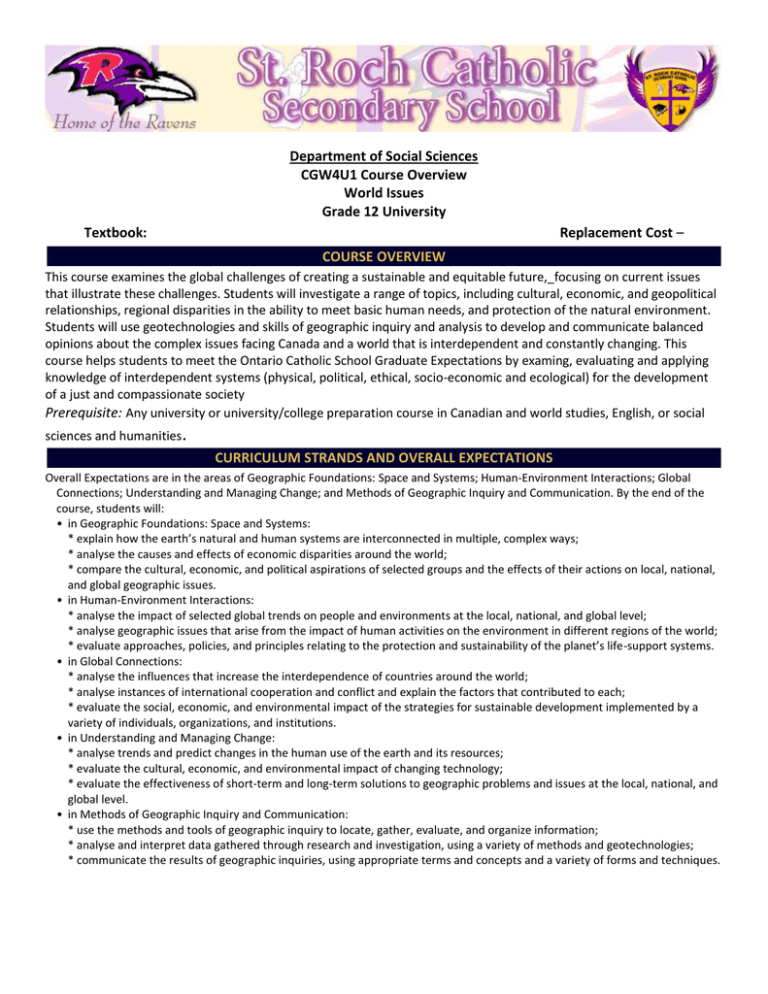
Department of Social Sciences CGW4U1 Course Overview World Issues Grade 12 University Textbook: Replacement Cost – COURSE OVERVIEW This course examines the global challenges of creating a sustainable and equitable future,_focusing on current issues that illustrate these challenges. Students will investigate a range of topics, including cultural, economic, and geopolitical relationships, regional disparities in the ability to meet basic human needs, and protection of the natural environment. Students will use geotechnologies and skills of geographic inquiry and analysis to develop and communicate balanced opinions about the complex issues facing Canada and a world that is interdependent and constantly changing. This course helps students to meet the Ontario Catholic School Graduate Expectations by examing, evaluating and applying knowledge of interdependent systems (physical, political, ethical, socio-economic and ecological) for the development of a just and compassionate society Prerequisite: Any university or university/college preparation course in Canadian and world studies, English, or social sciences and humanities. CURRICULUM STRANDS AND OVERALL EXPECTATIONS Overall Expectations are in the areas of Geographic Foundations: Space and Systems; Human-Environment Interactions; Global Connections; Understanding and Managing Change; and Methods of Geographic Inquiry and Communication. By the end of the course, students will: • in Geographic Foundations: Space and Systems: * explain how the earth’s natural and human systems are interconnected in multiple, complex ways; * analyse the causes and effects of economic disparities around the world; * compare the cultural, economic, and political aspirations of selected groups and the effects of their actions on local, national, and global geographic issues. • in Human-Environment Interactions: * analyse the impact of selected global trends on people and environments at the local, national, and global level; * analyse geographic issues that arise from the impact of human activities on the environment in different regions of the world; * evaluate approaches, policies, and principles relating to the protection and sustainability of the planet’s life-support systems. • in Global Connections: * analyse the influences that increase the interdependence of countries around the world; * analyse instances of international cooperation and conflict and explain the factors that contributed to each; * evaluate the social, economic, and environmental impact of the strategies for sustainable development implemented by a variety of individuals, organizations, and institutions. • in Understanding and Managing Change: * analyse trends and predict changes in the human use of the earth and its resources; * evaluate the cultural, economic, and environmental impact of changing technology; * evaluate the effectiveness of short-term and long-term solutions to geographic problems and issues at the local, national, and global level. • in Methods of Geographic Inquiry and Communication: * use the methods and tools of geographic inquiry to locate, gather, evaluate, and organize information; * analyse and interpret data gathered through research and investigation, using a variety of methods and geotechnologies; * communicate the results of geographic inquiries, using appropriate terms and concepts and a variety of forms and techniques. UNITS OF STUDY 1. Intro 2. Geopolitics 3. Demographics 4. Interdependency 5. Sustainability ASSESSMENT AND EVALUATION A final grade is recorded for every course, and a credit is granted and recorded for every course in which the student's grade is 50% or higher. The final grade for each course in Grades 9–12 will be determined as follows: • Seventy per cent (70%) of the grade will be based on evaluations conducted throughout the course. This portion of the grade should reflect the student’s most consistent level of achievement throughout the course, although special consideration should be given to more recent evidence of achievement . • Thirty per cent (30%) of the grade will be based on a final evaluation in the form of an examination, performance, essay, and/or other method of evaluation suitable to the course content and administered towards the end of the course. Term Work 70% Final Culminating Activity 10% Final Exam 20% Within these two areas, marks will be obtained using the four categories specified in the Ontario Curriculum: Canadian and World Studies, Grades 11 and 12 The categories of knowledge and skills are described as follows: Knowledge and Understanding. • Subject-specific content acquired in each course (knowledge), and the comprehension of its meaning and significance (understanding). 25% Thinking. The use of critical and creative thinking skills and/or processes, as follows : • planning skills (e.g., focusing research, gathering information, organizing an inquiry) • processing skills (e.g., analysing, evaluating, synthesizing) • critical/creative thinking processes (e.g., inquiry, problem solving, decision making, research) 25% Communication. The conveying of meaning through various forms , as follows : • oral (e.g., story, role play, song, debate) • written (e.g., report, letter, diary) • visual (e.g., model, map, chart, movement, video, computer graphics) 25% Application. • The use of knowledge and skills to make connections within and between various contexts. 25% Grade Range 80-100% Achievement Level Level 4 70-79% Level 3 60-69% Level 2 50-59% Level 1 Below 50% R Description A very high to outstanding level of achievement; above provincial standard A high level of achievement; at the provincial standard A moderate level of achievement; below, but approaching provincial standard A passable level of achievement; below provincial standard Insufficient achievement of expectations. A credit is not granted
